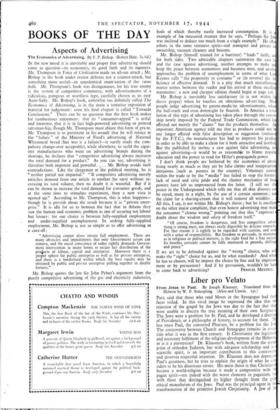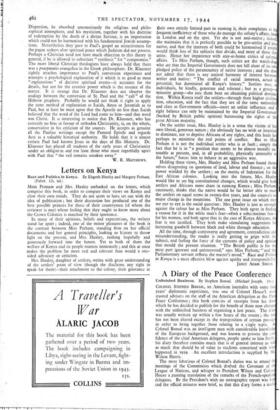Liber pro Velato
From Jesus to Paul. By Joseph Klausner. Translated from th Hebrew by W. F. Stinespring. (Allen and Unwin. iss.) PAUL said that those who read Moses in the Synagogue had the faces veiled. In this vivid image he expressed the idea that th rejection of the gospel by the Jews was due to the fact that the were unable to discern the true meaning of their own Scriptur The Jews were a problem for St. Paul, and he developed a doctrin of Providence, or a philosophy of history, to account for them. N less must Paul, the converted Pharisee, be a problem for the Jew The controversy between Church and Synagogue remains in essen tials what it was in the first century. Is Christianity the legitimat and necessary fulfilment of the religious development of the Hebrett or is it a perversion? Dr. Klausner's book, written from the stand point of orthodox Judaism, but with adequate scholarship and in scientific spirit, is an important contribution to this controvert and deserves respectful attention. Dr. klausner does not depreciat Paul's greatness, but he tries to explain the origin of what he co siders to be his disastrous errors. His main thesis is that Christian' became a world-religion because it made a compromise with t pagan spirit—not indeed with the worst elements in paganism, with those that distingushed its higher thought from the p ethical monotheism of the Jews. Paul was the principal agent in th transformation of the primitive Jewish Christianity. A Jew of th Dispersion, he absorbed unconsciously the religious and philo- sophical atmosphere, and his mysticism, together with his doctrine of redemption by the death of a divine Saviour, is an importation which could not be harmonised with his fundamental Jewish assump- tions. Nevertheless they gave to Paul's gospel an attractiveness for the pagan seekers after spiritual peace which Judaism did not possess. Perhaps a Christian need not have much objection to this theory in general, if he is allowed to substitute " synthesis " for " compromise." The more liberal Christian theologians have always held that there was a praeparatio evangelica in the Greek philosophers. Dr. Klausner rightly attaches importance to Paul's conversion experience and attempts a psychological explanation of it which is as good as most " explanations " of decisive spiritual events—it accounts for the details, but not for the creative power which is the essence of the matter. It is' strange that Dr. Klausner does not observe the analogy between the conversion of St. Paul and the " call " of the Hebrew prophets. Probably he would not think it right to apply the same method of explanation to Isaiah, Amos or Jeremiah as to Paul, but at least he must agree that the Apostle no less than Isaiah believed that the word of the Lord had come to him—and that word was Christ. It is interesting to notice that Dr. Klausner, who has certainly no bias in favour of orthodox Christianity, is, on the whole, conservative in his criticism of the sources. He accepts as genuine all the Pauline writings except the Pastoral Epistle and regards Acts as a valuable historical authority. He holds that it is almost certain Paul had known Jesus in the days of His Ministry. Dr. Klausner has placed all students of the early years of Christianity under an obligation and not least those who must regretfully agree with Paul that " the veil remains untaken away."
W. R. MATTHEWS.



























 Previous page
Previous page